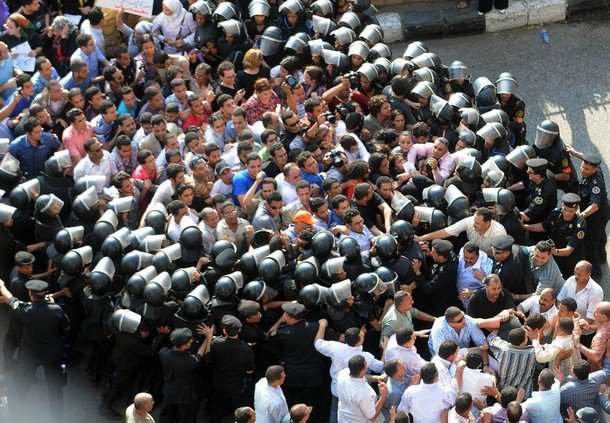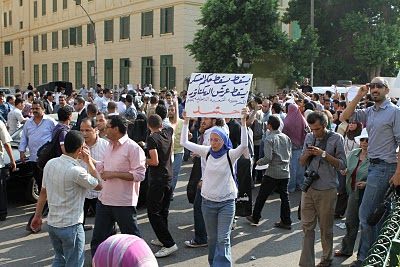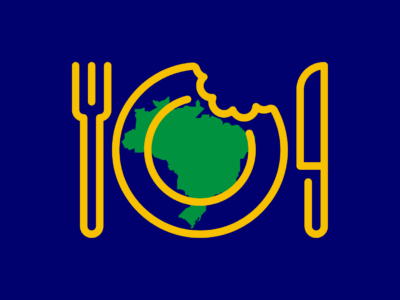Manifestações e raiva continuam no Egito após a morte de um jovem egípcio, alegadamente às mãos da polícia. A raiva na rua é evidente na web, onde o jornalismo cidadão fala.
Meu nome era Khaled e eu não era um Terrorista é o nome de uma nova página no Facebook condenando a tortura policial e o uso da Lei de Emergência para aterrorizar os cidadãos. “A lei de emergência é um instrumento nas mãos do poder executivo para passar por cima de muitos direitos fundamentais e da liberdade garantida pela Constituição egípcia”, explica a Federação Internacional para os Direitos Humanos. A morte de Khaled Said enfureceu muitos egípcios, que saíram em manifestações protestando contra seu assassinato brutal; a Anistia Internacional pediu ao governo egípcio para investigar o assassinato do jovem; e o governo alegou que ele era um criminoso.
O assassinato de Khaled é resumido novamente na página do Facebook:
The story began on 7th June 2010 when Khaled Saeed went to his usual Internet cafe in Sidigaber – Alexandria Egypt.
Then two wild detective cops – Mahmoud Alfallah and Awaad Elmokhber/the detective – ambushed that cafe asking people for their IDs which is totally out of their authority and without legal permission He – Khaled – did reject that way of inhumane treatment and conequently was attacked so viciously, was kicked in his chest and belly severely, and his skull was smashed with the marble bar before all people and witnesses in the cafe while khaled was bleeding. Then savage cops abducted khaled and put him inside the police vehicle to continue torturing him to death in the police station. Finally, they had thrown his corpse in the street to claim that he was attacked by some strangers in order to avoid responsibility.
All of this is a result for the oppression system that Mubarak control Egypt under emergency law which gives the police the upper hands to treat the residents as slaves.
A história começou em 07 de junho de 2010, quando Khaled Saeed foi para o seu habitual Internet café em Sidigaber – Alexandria, Egito.
Em seguida, dois selvagens policiais-detetives – Mahmoud Alfallah e Awaad Elmokhber / o detetive – emboscaram o café pedindo às pessoas suas identidades, o que está totalmente fora de sua autoridade e sem autorização legal. Ele – Khaled – rejeitou essa forma de tratamento desumano e conequentemente foi atacado perversamente, foi severamente chutado no peito e na barriga, e seu crânio foi esmagado no balcão de mármore ante todas as pessoas e testemunhas no café enquanto Khaled estava sangrando. Então os selvagem policiais sequestraram Khaled e o colocaram dentro do veículo policial para continuar a torturá-lo até a morte na delegacia. Finalmente, eles jogaram o cadáver na rua para alegar que ele havia sido atacado por alguns estranhos, a fim de evitar a responsabilidade.
Tudo isso é o resultado para o sistema de opressão que Mubarak controla o Egito sob a lei de emergência que dá à polícia a permissão para tratar os moradores como escravos.
Shadowy acrescenta:
Eyewitnesses –cyber café clients and street pedestrians- asserted that the whole beat thing had carried on constantly for 20 minutes, and had been executed in full view of everyone, accompanied by Khaled´s screams, tears, and cries for help.
Another witness, Mahmoud Ali, reported that the two policemen had taken the victim´s body to “Seidy Gaber” police station, and brought it back 15 minutes later to the crime scene, and called an ambulance in order for them to get away with their crime.
Khaled´s brother certified to “Shorouk Newspaper” that Khaled had never been detained that particular night in any police station or elsewhere, and that he was very well-behaved, well-liked, and admired by his neighbors and friends. He also mentioned that he´s from a virtuous family, whose sons aren´t prison birds. “As soon as I had heard the police station´s conviction of my brother, I headed straight for the American Embassy and informed them of the incident, since I´m American citizen; I thought my American passport would safeguard me, in lieu of the Egyptian one, which is the main reason for his holder´s dishonor” He added.
The victim´s attorney, Waleed Saeed, had filed a complaint to the public prosecutor, accusing the two policemen of beating and torturing Khaled to death, and dragging his corpse all the way to the police station.
Who could have ever thought that the price Khaled would pay for asking “why” his basic rights were violated was going to be his life?! Well, as it turns out, this is the case under emergency law; every Egyptian should think twice, before he goes too far and decides stand up for his civil rights, assuming he is Martin Luther King of his age.
Testemunhas – clientes do cyber-café e pedestres – afirmaram que a coisa toda do espancamento aconteceu sem parar por 20 minutos, e ele [Khaled] foi executado em plena vista de todos, acompanhado pelos gritos de Khaled, lágrimas e gritos de socorro.
Outra testemunha, Ali Mahmoud, informou que os dois policiais haviam levado o corpo da vítima para a delegacia de “Seidy Gaber”, e [os policiais] trouxeram [o corpo] de volta à cena do crime 15 minutos depois, e chamaram uma ambulância, a fim de fugir com seus crimes.
O irmão de Khaled confirmou ao jornal “Shorouk” que Khaled nunca tinha sido detido [até] aquela noite em particular em qualquer delegacia ou em outro lugar, e que ele era muito bem-comportado, as pessoas gostavam dele e [ele era] admirado por seus vizinhos e amigos. Ele também mencionou que ele vem de uma família virtuosa, cujos filhos não são comumente presos. “Assim que eu ouvi sobre a prisão do meu irmão na delegacia de polícia , fui direto para a embaixada americana e os informei sobre o incidente, já que eu sou cidadão americano, eu pensei que meu passaporte americano iria me proteger, em vez de o egípcio, que é a principal razão para desonrar o seu titular “, acrescentou.
O advogado da vítima, Waleed Saeed, tinha apresentado uma queixa ao Ministério Público, acusando os dois policiais de espancar e torturar Khaled até a morte, e de arrastar o cadáver todo o caminho até a delegacia.
Quem poderia ter pensado que o preço que Khaled pagaria para perguntar “por que” seus direitos fundamentais foram violados ia ser a sua vida?! Bem, como se vê, este é o caso sob a lei de emergência; todos os egípcios deveriam pensar duas vezes, antes que ele vá longe demais e decida lutar por seus direitos civis, assumindo que ele é o Martin Luther King de sua idade.
Traveller Within destacou como a polícia tratou a cena do crime
Policemen subsequently returned to the scene in search of any recording devices or phones that could’ve reported the incident. They failed however to prevent the news from being covered and widely shared via Twitter and other social media tools, which detailed accounts of the events, shared photos of the deceased before and after his death, and began to organize for demonstrations and civil actions to bring the alleged perpetrators to justice and to protest the use of Emergency law, in place since 1981 and extended just last month for a further 2 years, with the explicit declaration by the state that it would only be used “in cases of terrorism and drug trafficking”.
Will E. compareceu à demonstração de 13 de junho e deu o seguinte depoimento:
Upon my arrival I was pulled by the shirt and threatened to be arrested and was about to be if the policemen weren't busy dragging two other guys to the police truck, but that's an insignificant event in the scheme of things. I have to make it clear that I hadn’t uttered a word when I had first arrived and that I was addressed with the most impolite names and a very disrespectful manner. I was threatened that I would be ‘taken’, anyone that was in the area would be ‘taken’, the policeman said before starting to drag me.The two that were dragged upon my arrival happened to be in the area outside the perimeter. The police routinely confiscated cameras, and deleted all videos and images. To the best of my knowledge some cameras were given back and I cannot bear witness to the fate of the cameras. The policemen were all over the buildings and whenever chants would start, they'd give them a few minutes and then charge them.A few people were injured, one of our friends was taken to a hospital, another person fleeing a charge from the police fell on his head and his face was covered in blood. They put him in a cab with what looked like a security person but I don’t know where he was taken.There was fear in the air, fear of expressing any opinion in the protest, those officially surrounded had their view blocked by the men in black (amn markazy). For the police themselves it was business as usual, they didn’t care what was chanted, or who they were abusing.
Os dois que foram arrastados após a minha chegada aconteceu de estarem na área fora do perímetro. A polícia, como de rotina, confiscou as câmeras e apagou todos os vídeos e imagens. Ao melhor de meu conhecimento, algumas câmeras foram devolvidos e não posso dar testemunho do destino das câmeras. Os policiais estavam todos ao longo dos edifícios e em qualquer lugar em que cantos [de protesto] poderiam começar, eles [os policiais] lhes davam alguns minutos e depois avançava contra eles [os manifestantes].
Algumas pessoas ficaram feridas, um dos nossos amigos foi levado a um hospital, uma outra pessoa que fugiu de uma carga da polícia caiu de cabeça e seu rosto estava coberto de sangue. Eles o colocaram em um táxi com o que parecia ser uma pessoa de segurança, mas não sei para onde ele foi levado.
Havia medo no ar, o medo de expressar qualquer opinião no protesto, aqueles oficialmente cercados tinham sua visão bloqueada pelos homens de preto (amn markazy). Para a polícia em si [o protesto] era um negócio usual, a eles não importa o que fosse cantado, ou quem eles estavam abusando.
The Traveller Within postou vídeos, fotos, clips ao vivo, e escreveu:
There were several demonstrations across Cairo yesterday, demanding justice for Khaled Mohamed Said and for his assassins to be judged – all the way up to the Minister of Interior, Habib El Adly. As one of the slogans chanted said–
“If that were Israel (or anywhere else, for that matter), El Adly's head would be gone”Not in Egypt. Not when, as, once again, people chanted, the main purpose of the Police's existence is to protect the regime from the people.
Houve várias manifestações no Cairo ontem exigindo justiça para Khaled Mohamed Said e para que seus assassinos serem julgados – todo o caminho até o ministro do Interior, Habib El Adly. Como um dos slogans cantados disse: “Se fosse em Israel (ou em qualquer outro lugar, para dizer a verdade), a cabeça El Adly teria caído”Não no Egito. Nem quando, como mais uma vez, as pessoas gritavam, a finalidade principal da existência da polícia é para proteger o regime das pessoas.
Do protesto, Zeinobia escreveu:
The best photo I found for the protest was this photo from Assad.
Also here is another photo from Affet
I do not know how the regime dares and opens its mouth in front of the photos showing the brutality of the police against peaceful protesters.Just see the videos and slide shows below to understand what I mean.
Também aqui uma outra foto, de Affet
Eu não sei como o regime ousa e abre a sua boca na frente das fotos mostrando a brutalidade da polícia contra os manifestantes pacíficos. Apenas veja os vídeos e slides mostrados abaixo para entender o que eu quero dizer.
A blogueira e jornalista Sarah Carr também foi uma testemunha do Governo dos Javalis [fotos detalhadas]
More blundering, crass stupidity from the police yesterday, as they responded to demonstrators protesting police violence with violence, again.
Some 150 people assembled in Lazoghly Square – home of a state security headquarters – at 5 p.m. This number quickly grew as protestors prevented from gathering outside the main gate of the Interior Ministry – as had originally been planned – converged on the square. They managed to circle the square twice before the police were able to get their shit together. The usual black cordon of cannon fodder was quickly formed and we were hermetically sealed in.
We were well and truly kettled.
Mais estupidez, grosseria desajeitada da polícia ontem, enquanto eles respondiam aos manifestantes que protestavam contra a violência policial com violência, mais uma vez.
Cerca de 150 pessoas reunidas na Praça Lazoghly – sede de uma central de segurança do Estado – às 17:00. Esse número cresceu rapidamente com os manifestantes sendo impedidos de se reunir fora da entrada principal do Ministério do Interior – como tinha sido inicialmente previsto – convergiram na praça. Eles conseguiram dar a volta na praça duas vezes antes de a polícia ser capaz de organizar sua tropa. O usual cordão preto de buchas de canhão foi rapidamente formado e nós estávamos hermeticamente fechados.
Estávamos bem e verdadeiramente sitiados.
Amr Salama postou mais fotos do protesto aqui.
Kareem El Beheiry postou vídeos vídeos da repressão policial e das agressões aos manifestantes aqui.
Então porque Khaled realmente morreu? Tabula Gaza respondeu:
Over the past few months I have been working on a video project about torture, so when I heard about the public beating and murder of 28-year old Khaled Sayed Thursday night it came as no surprise. According to blogger Mfatta7, Khaled had either filmed or obtained a video that reveals a number of police officers involved in a drug deal. This is the video provided by his sister [exposing police corruption and a drug dealing incident]
Amr Salama anotou a conversa no vídeo
Sandmonkey escreveu:
When the story went out, and people saw the pictures, they were of course enraged. About a 1000 people gathered after the Friday prayers to protest in front of the police stations, and there are plans to do sit ins and demos this entire week, demanding that people take action, before they become the next Khaled. The Ministery of Interior swiftly responded, by stating that Khaled was a criminal and a womanizer and a drug dealer and responsible for 9/11, and that he died from Asphysxiation, and the picture is simply after his body was diagnosed by the Coroner. And that really, really, we should be glad that such a menace to society at large is not with us anymore.
No dia 12 de Junho de 2010, o departamento de mídia e relações públicas do ministério egípcio do interior emitiu um comunicado negando o teor dos depoimentos das testemunhas, bem como os relatórios de organizações de direitos humanos sobre a morte de Khaled Said, em Alexandria, acusando aquelas declarações de imprecisão, falsificação flagrante, e de cruzar a linha na divulgação de mentiras e etc. e Tabula Gaza compartilhou a declaração oficial do Centro Al Nadeem [declaração na íntegra aqui]
The MOI [Ministry Of Interior] statement then concluded that it will not “back down no matter how much the allegations”. Nor shall we, no matter how much MOI spread their lies and terror. We shall continue to expose crimes of torture, reach out for the victims, provide legal, psychological and media support as well as all other forms of support until the torturers are brought to justice.. As long as there is no public apology.. as long as there is torture.. as long as the perpetrators are not brought to justice.. we shall not back down
Limpando a imagem de Khaled, Zeinobia escreve:
The people are very angry in Alex especially in Sidi Gaber with the false reports about Khalid that led his friend and journalist Bahaa El-Tawil to write an Op-ed about late Khalid , the other Khalid the MOI did not know who refused to leave this county because he loves this country !! The other Khalid who did not escape from his military service as the MOI has claimed , the other Khalid who did not smoke a cigarette.
Ela também postou um vídeo dos vizinhos de Khalid o defendendo e o testemunho do dono do cyber-café.
E mesmo se Khaled fosse um “maconheiro”, um delinquente sexual ou um terrorista como o Ministério do Interior alegou, Zeinobia se pergunta:
Do the police plain clothed agents have the right to search other citizens !!?? If No – which is the answer – then why they were searching the people !!??
Was there an official investigation warrant issued to search anyone in that street!!??
How did those agents know that Khalid was a dangerous con !!??
If we believe the MOI statement, shall we wonder how Khalid knew that the two men walking in the street in plain clothes were actually police agents !!??
Havia um mandado de inquérito oficial emitido para revistar qualquer um na rua!?
Como é que os agentes sabiam que Khalid era um criminoso perigoso!?
Se nós acreditamos na declaração do MOI, vamos nos perguntar como Khalid sabia que os dois homens andando na rua à paisana eram realmente agentes da polícia!?
Sandmonkey conclui seu post dizendo:
Egypt likes to refer to itself as the land of Security and Safety. Please note that we always put the word Security first. We like to think we are safe, that we are better than those evil western countries, where a woman is raped every 48 seconds or whatever, but we are not. We are not Safe. None of us is. Not n this country, not in this world. Any one of us could lose that spark of life at any minute, and the lucky ones get it quickly and painlessly. The unlucky ones suffer. The really unlucky ones end up like Khaled.








3 comentários